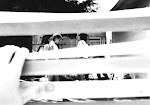 The town I live in, Henderson, Nevada, began as a World War II boomtown. A year before Pearl Harbor a British company established itself here to procure magnesium to make bombs to drop on people. The government encouraged people to leave Louisiana and Arkansas to work in the plant, and built them houses and a shopping center. We still have Army, Victory, Atlantic and Pacific streets downtown. Even after the war Henderson continued to be mostly industrial, making, among other things, rocket fuel. (Which is why we have perchlorate in our water.) Now Henderson is mostly suburban. It has a 1950s-style downtown, which is plain rather than quaint. Every now and then it appears to be a small inter-mountain West town, rather than a place that has been conquered by Las Vegas.
The town I live in, Henderson, Nevada, began as a World War II boomtown. A year before Pearl Harbor a British company established itself here to procure magnesium to make bombs to drop on people. The government encouraged people to leave Louisiana and Arkansas to work in the plant, and built them houses and a shopping center. We still have Army, Victory, Atlantic and Pacific streets downtown. Even after the war Henderson continued to be mostly industrial, making, among other things, rocket fuel. (Which is why we have perchlorate in our water.) Now Henderson is mostly suburban. It has a 1950s-style downtown, which is plain rather than quaint. Every now and then it appears to be a small inter-mountain West town, rather than a place that has been conquered by Las Vegas.Which brings me to The Vat.
Where did it come from? Who left it? Will they ever come back? Is it perhaps the subject of a long-running property dispute/lawsuit so that it continues to flaunt its rusty industrial self opposite our brand-new Target? Am I the only one who ever looks at it, as I drive down Lake Mead, and wonders these things?
I don't know the answers. I just hope they never get rid of it.








